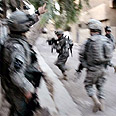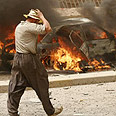
US soldiers in Iraq
Photo: AP

Terror attack in Kirkuk (archives)
Photo: Reuters
The US military on Tuesday announced the deaths of five more soldiers and one sailor, making 2007 the deadliest year for US troops despite a recent downturn, according to an Associated Press count.
The grim milestone passed despite a sharp drop in US and Iraqi deaths here in recent months, after a 30,000-strong US force buildup. There were 39 deaths in October, compared to 65 in September and 84 in August.
At least 853 American military personnel have died in Iraq so far this year — the highest annual toll since the war began in March 2003, according to AP figures.
Opinion
Yoram Schweitzer
Prospect of ‘Iraq alumni’ terror attacks worldwide could undermine US victory in Iraq
Five US soldiers were killed Monday in two separate roadside bomb attacks, said Rear Adm. Gregory Smith, director of the Multi-National Force-Iraq's communications division.
"We lost five soldiers yesterday in two unfortunate incidents, both involving IEDs," Smith told reporters in Baghdad's heavily-guarded Green Zone. Later, the military said four of the soldiers died after an explosion near their vehicle in Kirkuk province, and one was killed in Anbar.
In a third statement, American forces said a sailor died of injuries from an explosion Monday in Salahuddin province, north of Baghdad.
With nearly two months left in the year, the US toll has already surpassed that of 2004, when 850 troops died — mostly in larger, more conventional battles like the campaign to cleanse Fallujah of Sunni militants in November, and US clashes with Shiite militiamen in the sect's holy city of Najaf in August.
But the American military in Iraq reached its highest troop levels in Iraq this year — 165,000. Moreover, the military's decision to send soldiers out of large bases and into Iraqi communities means more troops have seen more "contact with enemy forces" than ever before, said Maj. Winfield Danielson, a US military spokesman in Baghdad.
"It's due to the troop surge, which allowed us to go into areas that were previously safe havens for insurgents," Danielson told the AP on Sunday. "Having more soldiers, and having them out in the communities, certainly contributes to our casualties."
'Iran appears to be keeping its promise'
Meanwhile, the US said it planned to release nine Iranian prisoners in the coming days, including two captured when US troops stormed an Iranian government office in Irbil last January. The office was shut after the raid, but it reopened as an Iranian consulate on Tuesday, Iraqi and Iranian officials said.A military spokesman said Iran appears to have kept its promise to stop the flow into Iraq of bomb-making materials and other weaponry that Washington says has inflamed insurgent violence and caused many American troop casualties.
Defense Secretary Robert Gates said last week that Iran had made such assurances to the Iraqi government.
"It's our best judgment that these particular EFPs ... in recent large cache finds do not appear to have arrived here in Iraq after those pledges were made," Rear Adm. Gregory Smith, director of the Multi-National Force-Iraq's communications division, told reporters Tuesday.
Kurdish rebels released another Iranian soldier captured two months ago in northern Iraq. AP Television News showed the soldier being handed over to representatives of the International Committee of the Red Cross in the Qandeel mountains near the town of Ilan Shahir.
Among the weapons Washington has accused Iran of supplying to Iraqi insurgents are EFPs, or explosively formed projectiles. They fire a slug of molten metal capable of penetrating even the most heavily armored military vehicles, and thus are more deadly than other roadside bombs.
The No. 2 US commander in Iraq, Lt. Gen. Ray Odierno, said last week that there had been a sharp decline in the number of EFPs found in Iraq in the last three months. At the time, he and Gates both said it was too early to tell whether the trend would hold, and whether it could be attributed to action by Iranian authorities. Iran publicly denies that it has sent weapons to Shiite militias in Iraq.
Also Tuesday, the US military said Iraqi troops had discovered 22 bodies in a mass grave northwest of Baghdad over the weekend. The bodies were found during a joint operation Saturday. It was the second mass grave found in the area in less than a month.
After the discovery, US and Iraqi forces launched an operation Sunday, including ground raids and air assaults targeting al-Qaeda in the area, the US statement said.
About 30 suspects were detained, it said. Two car bomb facilities and a number of weapons caches also were found, it added.
Iraqi officials were trying to identify the bodies and notify families.















